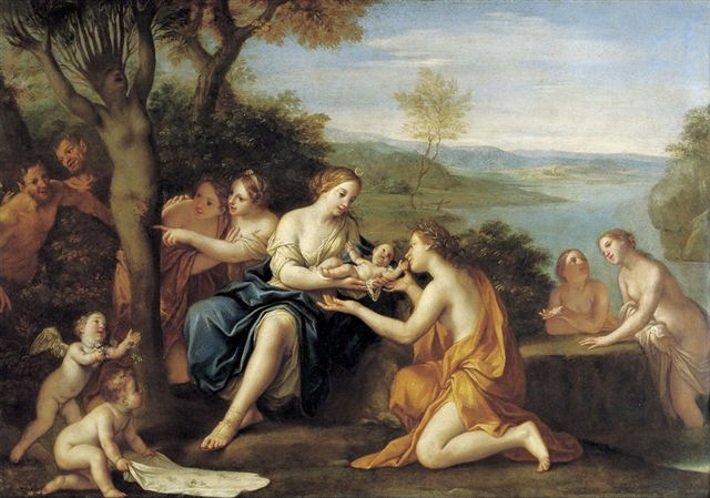MYRRHA IN GREEK MYTHOLOGY
Myrrha in Greek Mythology
Myrrha, who is also known as Smyma, was the daughter of King Cinyras of Cyprus in Greek mythology. Myrrha was also the mother of Adonis, born of an incestuous relationship.
Myrrha Daughter of Cinyras
Many different versions of the Myrrha myth are told of in antiquity, hence why Myrrha is also known as Smyma in some versions.
Most commonly, Myrrha is named as a daughter of King Cinyras of Cyprus and his wife, Cenchreis.
Alternatively, some call Myrrha daughter of King Theias of Assyria, by the nymph Oreithya.
Most commonly, Myrrha is named as a daughter of King Cinyras of Cyprus and his wife, Cenchreis.
Alternatively, some call Myrrha daughter of King Theias of Assyria, by the nymph Oreithya.
Aphrodite's Curse
|
Myrrha was said to have grown into a beautiful woman who had many suitors, but Myrrha would be cursed by the goddess Aphrodite. This curse was perhaps due to Myrrha spurning the worship of the goddess, but more commonly it was said that Myrrha’s mother, Cenchreis boasted of Myrrha’s beauty surpassing that of Aphrodite.
Aphrodite’s curse, saw Myrrha fall physically in love with her father. Myrrha was said to have tried to suppress her desires, but when they became too much, Myrrha attempted suicide; but, Myrrha was discovered in her attempt by her nurse. When nothing could be done to prevent Myrrha’s desires, the nurse came up with a plan by which Myrrha could seemingly safely give in to Aphrodite’s curse. |
|
Myrrha Sleeps With Her Father
The nurse went to Cinyras, and told the king that a noble woman which to lie with him, but in order to keep her reputation intact, she would only do so if the bedroom was kept in total darkness.
Queen Cenchreis was absent from the royal bedroom, for it was the time of a festival dedicated to Demeter, and so for several nights, Myrrha slept with her father.
Eventually though, Cinyras became curious about the woman who came to his bedroom each night, and bringing forth a lamp, Cinyras discovered that he was in an incestuous relationship with his own daughter.
Myrrha’s life was now in danger, for Cinyras took up his sword, and would have killed his own daughter, if Myrrha had not fled from the palace.
Queen Cenchreis was absent from the royal bedroom, for it was the time of a festival dedicated to Demeter, and so for several nights, Myrrha slept with her father.
Eventually though, Cinyras became curious about the woman who came to his bedroom each night, and bringing forth a lamp, Cinyras discovered that he was in an incestuous relationship with his own daughter.
Myrrha’s life was now in danger, for Cinyras took up his sword, and would have killed his own daughter, if Myrrha had not fled from the palace.
The Transformation of Myrrha
|
Some tell of Myrrha fleeing from Cyprus, and wondering Arabia; Myrrha though, had fallen pregnant following the nights lying with her father. Myrrha now offered up prayers to the gods.
A god, potentially Zeus, took pity on her, and transformed her into a shrub or tree, the Myrrh bush, which exudes sap, myrrh, which was also known as smyrna by the ancient Greeks. |
|
As Myrrha had been pregnant when she was transformed, it was also said that a son came forth from the transformed tree, this son of Myrrha and Cinyras being Adonis.
|
|
Colin Quartermain - Myrrha - 28th February 2020
